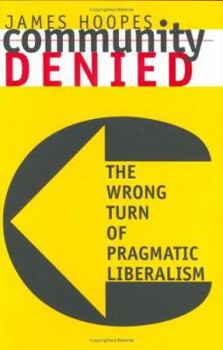Community Denied
Did modern American social thought take a wrong turn when it followed John Dewey and William James? In this searching history of early twentieth-century political theory, James Hoopes suggests that, contrary to conventional wisdom, these pragmatic philosophers did not provide the basis for a socially-minded political theory. Dewey and James did not provide intellectual safeguards against the amoral acceptance of realpolitik and managerial elitism that has given liberalism a bad name. Hoopes finds a more substantial basis for liberal political theory in the communitarian-based pragmatism of Charles Sanders Peirce. Had modern social thought been influenced by Peirce, argues Hoopes, society could be seen as a set of interpretive relationships rather than a collection of discrete interests to be managed from the top down by elitist experts. Hoopes traces the influence of James and Dewey in the thought of Walter Lippman, Reinhold Niebuhr, and Mary Parker Follett. He concludes with a critical examination of contemporary thinkers, most notably Richard Rorty, who believe that James and Dewey offered the most socially useful philosophy within the pragmatic tradition. Combining philosophy, political theory, history, and close textual analysis in original ways, Community Denied offers a bold departure from previous studies of the subject and demonstrates the damage done to liberalism by reliance on a philosophy with no way of truly conceptualizing community.
Format:Hardcover
Language:English
ISBN:0801435005
ISBN13:9780801435003
Release Date:January 1998
Publisher:Cornell University Press
Length:192 Pages
Weight:0.95 lbs.
Dimensions:0.7" x 6.2" x 9.3"
Customer Reviews
0 rating





